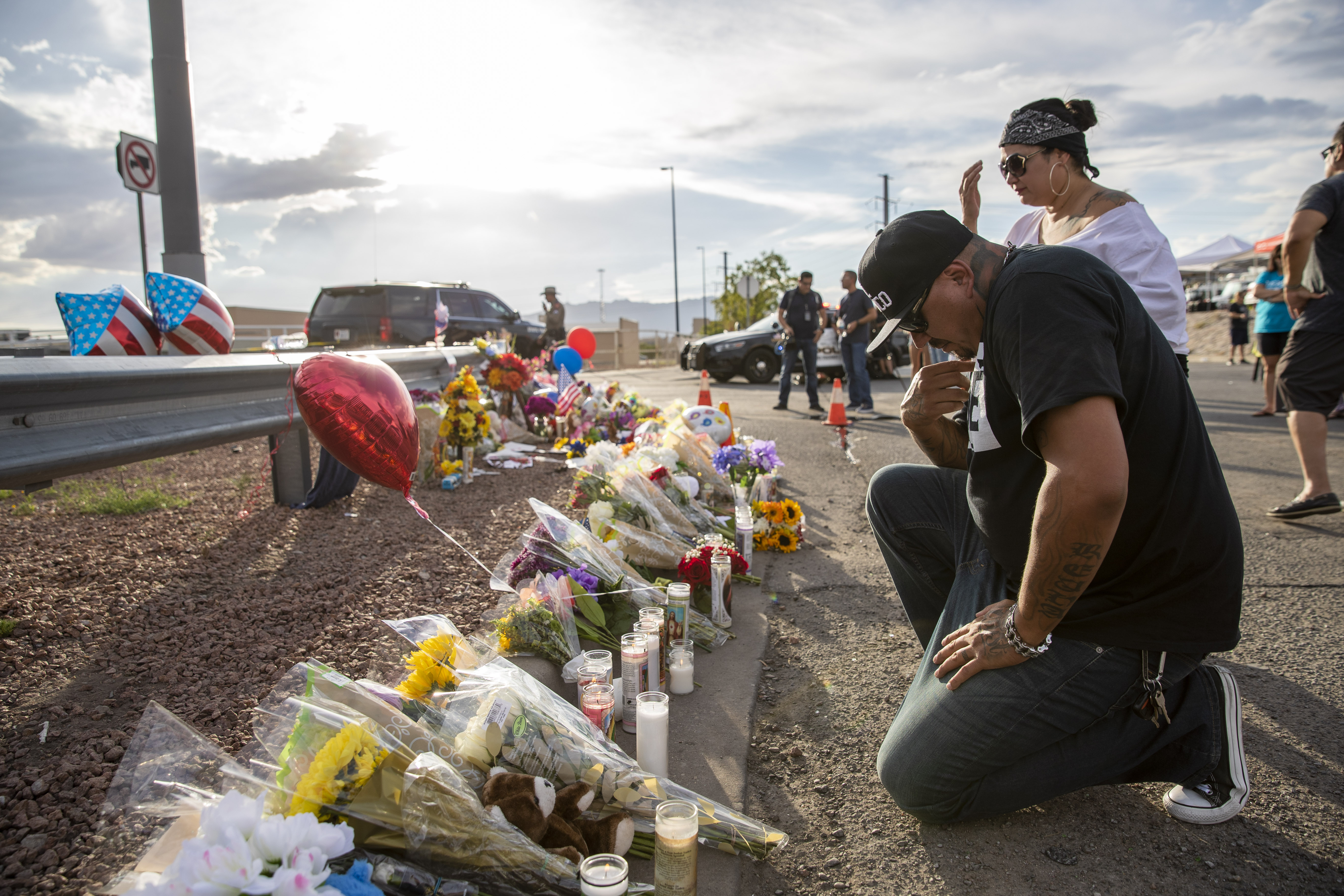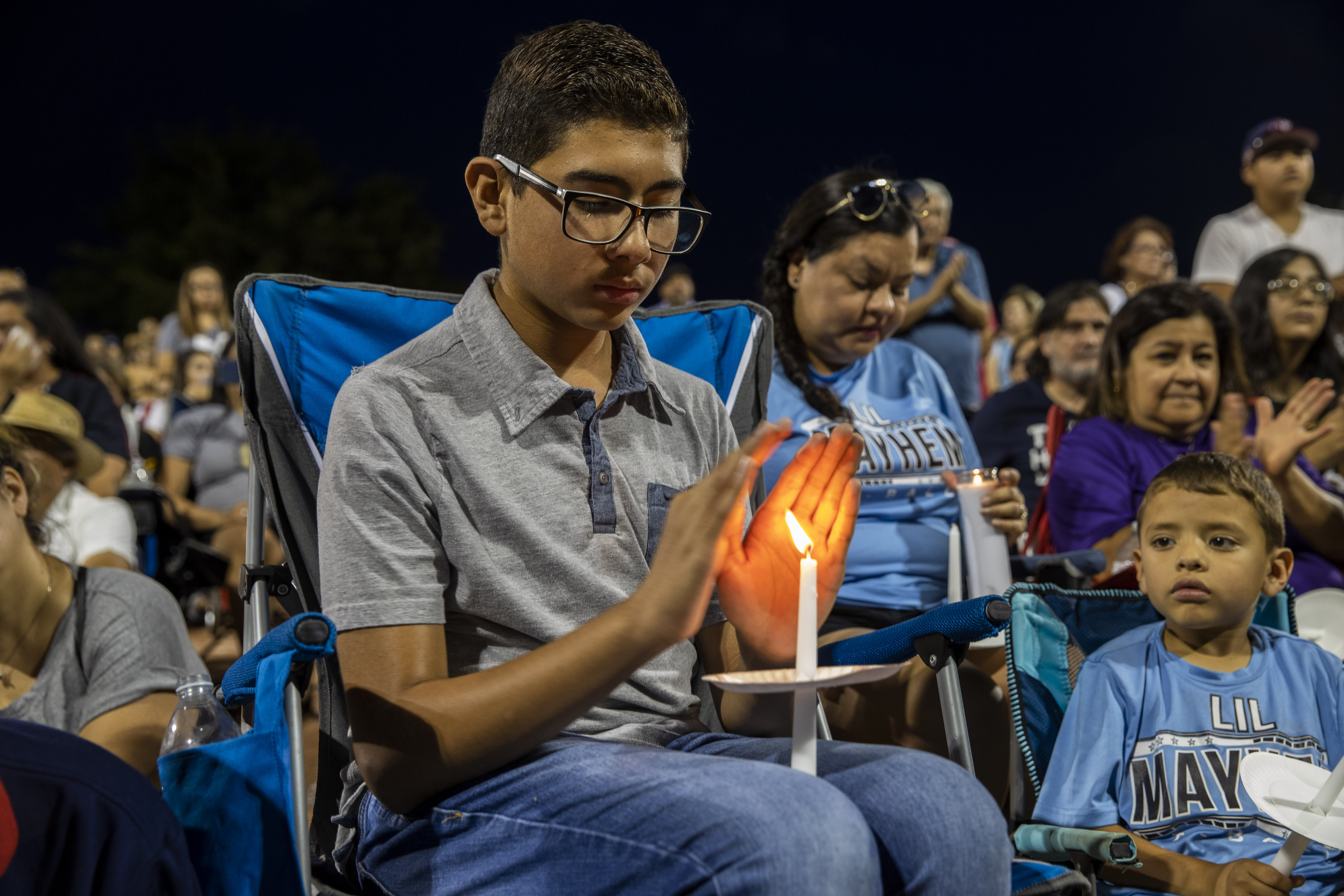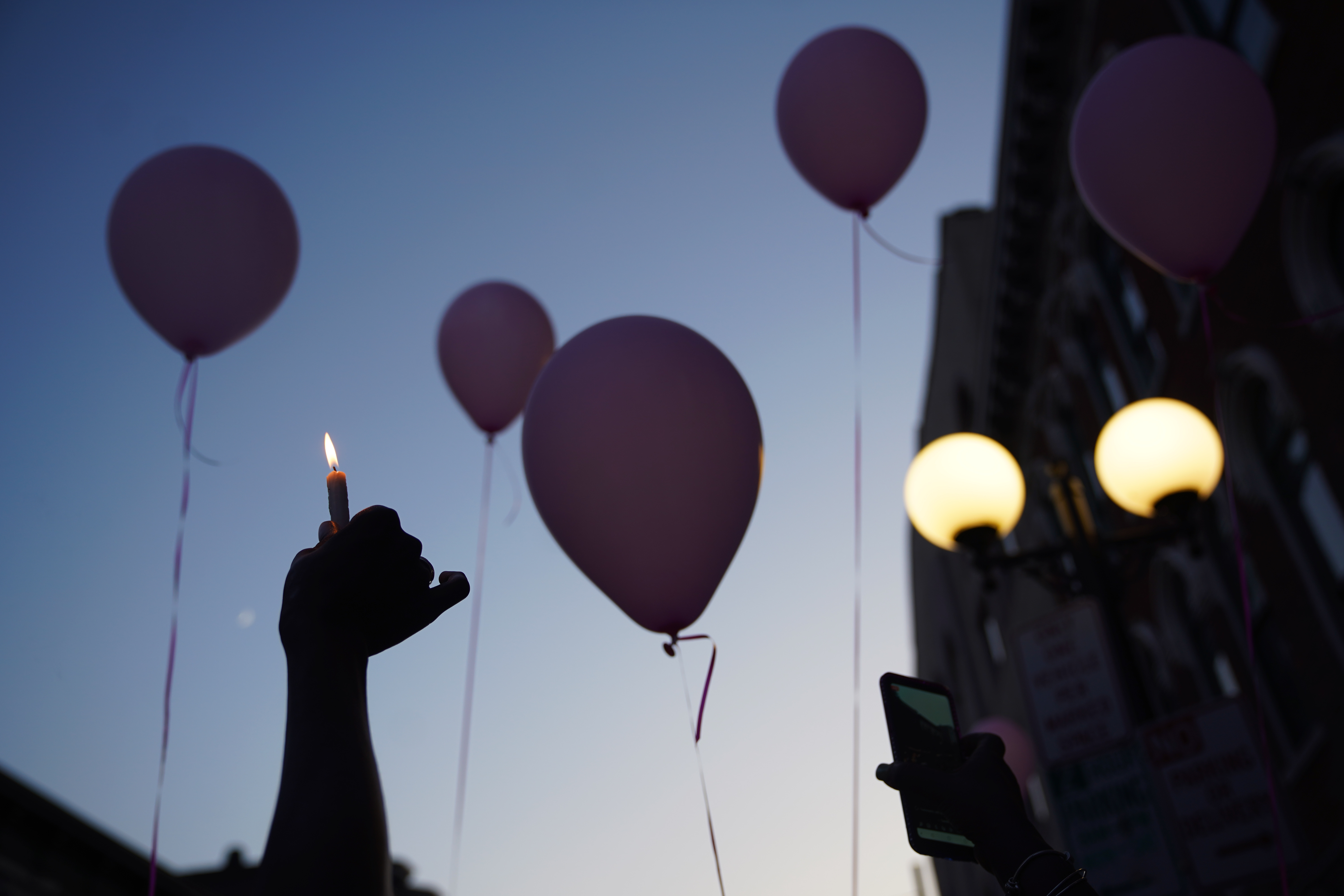

EL PASO, the United States, Aug. 5 (Xinhua) -- Two mass shootings over the weekend in the United States forced the country to confront an American nightmare originating from a deadly mix of a gun violence epidemic and racial tensions.
The shootings took place within 13 hours. On Saturday, one in a Walmart store in the city of El Paso, a border city in western Texas, killed 20, including six Mexicans; the other in a popular bar district in Dayton, southwestern Ohio, claimed nine lives on Sunday morning.
As the latest episodes in a growing trend of gun violence in the United States, the shooting sprees show a national deadlock on whether to place more stringent measures on gun ownership. Added to this, racial tensions are raising more concerns.


People mourn for victims near the shooting site in El Paso, Texas, the United States, Aug. 4, 2019. (Xinhua/Wang Ying)
NIGHTMARE CLOUDS WEEKEND
On Sunday, hundreds of people, all in grief, were spotted gathering in El Paso and Dayton, holding flower bouquets and candles.
"It's really heartbreaking," Araceli Montoya, a local resident in El Paso, told Xinhua at a vigil gathering in Ponder Park.
At several local prayer vigils, the mourners sang, prayed, linked arms, held hands and cried together, offering condolences to the families of the victims of the mass shootings, which also left dozens injured.
On Saturday, a 21-year-old white male opened fire at throngs of shoppers in a Walmart supermarket in El Paso. The suspect, identified as Patrick Crusius, was taken into custody and is believed to have acted on anti-immigrant sentiment.
"There is a potential nexus to a hate crime," said El Paso Police Chief Greg Allen, who said the suspect had published a four-page manifesto online that called the attack "a response to the Hispanic invasion of Texas."


The Walmart shopping mall area is cordoned off after a mass shooting in El Paso of Texas, the United States, Aug. 4, 2019. (Xinhua/Liu Liwei)
While authorities are trying to determine whether Crusius authored the document, they are probing the case as an act of domestic terrorism.
The nightmare continued. On Sunday morning, Connor Betts, a 24-year-old white male, opened fire in a popular bar district in Dayton, killing nine and injuring 27 others before he was killed by the police.
Those killed were four women and five men, ranging in age from 22 to 57, including Betts' younger sister. Of the 27 people injured, four remained in serious condition and one in critical condition, authorities said.
The gunman was carrying a .223-caliber rifle with additional high-capacity magazines and was wearing a mask or covering over his face, Dayton Mayor Nan Whaley said at a press conference.
"If the Dayton police had not gotten to the shooter in under a minute, hundreds of people in the Oregon District would be dead today," Whaley said.


People attend a vigil held to mourn for victims of Dayton shooting in Dayton of Ohio, the United States, Aug. 4, 2019. (Xinhua/Liu Jie)
GUN VIOLENCE NEGLECTED
"We are losing lives every single day," Amanda Luke, a resident in Dayton, told Xinhua on Sunday during an event in memory of the shooting victims. "There's no other country in the world like this."
So far this year, 33,195 incidents of gun violence happened in the United States, killing 8,782 and injuring 17,453, according to the Gun Violence Archive, a Washington D.C.-based non-profit organization.
The last decade saw a vast array of deadly shootings in the country. Among the most severe cases, in 2012, a deranged gunman entered an elementary school in Connecticut and murdered 28 people, many children included; in 2016, a gunman killed 49 at a nightclub frequented by gays in Orlando; and the 2017 Las Vegas shooting claimed nearly 60 lives and injured 500 others.
Such bloody tragedies, however, seem far from convincing for some U.S. politicians to put aside partisan differences and take concerted efforts to remove one of the deadliest threats to U.S. citizens, once and for all.
In many U.S. states, one does not need to undergo a background check to purchase a semi-automatic assault rifle at gun shows. In most cases, even an identification card is not required for the purchase.


People take part in a prayer and vigil at Ponder Park in El Paso, Texas, the United States, Aug. 4, 2019. (Xinhua/Wang Ying)
Following the 2012 school shooting in Connecticut, the Obama administration once initiated but failed to push for stronger gun control laws.
"Most Republican legislators will do nothing because many of their constituents favor gun rights and do not want to see significant restrictions," Brookings Institution Senior Fellow Darrell West told Xinhua. "Until that changes, there is not likely to be any meaningful legislation in this area."
Although Democrats may introduce bills on a national level, experts said they will not go far in a divided Congress.
Shortly after the El Paso shooting, U.S. House Speaker Nancy Pelosi slammed Republicans who hold the majority of the Senate for "continued inaction" on passing gun control legislation.
"Enough is enough," she said. "Too many families in too many communities have been forced to endure the daily horror of gun violence."


People take part in a prayer and vigil at Ponder Park in El Paso, Texas, the United States, Aug. 4, 2019. (Xinhua/Wang Ying)
RACIAL TENSIONS BITE
"I think the shooter is a racist," a Walmart employee who gave her name as Ruth told Xinhua at the vigil gathering in Ponder Park. Two of her colleagues had been shot and were in the hospital. "Many Mexican customers come to Walmart all day every day. People are very friendly in El Paso."
In the four-page manifesto titled "The Inconvenient Truth," the author added that he was against "race mixing" that he believes leads to "identity problems." It stated a plan to separate the country into territories by race, warning that white people were being replaced by foreigners.
Racial tensions bite. The phenomena of promoting white supremacy and inciting racial discrimination and hatred have long existed in American society, according to a United Nations report.
Hate crimes rose by about 17 percent to 7,175 cases in the United States in 2017, said a report released by the Federal Bureau of Investigation last November. It added that offenses motivated by racial prejudice made up about 60 percent of hate crimes, with African-Americans being targeted in nearly half of them.
White extremist ideology has been linked to at least four of the 10 deadliest active-shooter episodes in the United States in recent years, said a New York Times article on Sunday.

People attend a vigil held to mourn for victims of Dayton shooting in Dayton of Ohio, the United States, Aug. 4, 2019. (Xinhua/Liu Jie)
For example, during a shooting at a synagogue in Pittsburgh last October that killed 11, the gunman, who is a heavy-set white male with a beard, made anti-Semitic statements. He also targeted Jews on social media.
Nikolas Cruz, a 19-year-old expelled student, shot dead 17 people at a high school in Florida. He repeatedly made racist remarks, using phrases such as "white power" and drawing swastikas on desks.
"The fact is that Americans have grown comfortable with racism resting just beneath the surface of our politics -- to be activated whenever a politician or a community needed it, or some racist incident exhumed it only for us to bury it once again," said Eddie S. Glaude, Jr., chair of the Department of African American Studies at Princeton University, in a Time magazine article.
After the El Paso shooting, Montoya attended the vigil alone. She said it's hard to believe a brutal shooting would have happened in such a friendly city.
"We don't care about the skin color, the language or if I have an accent," she said. "We love people. We welcome people."

 Award-winning photos show poverty reduction achievements in NE China's Jilin province
Award-winning photos show poverty reduction achievements in NE China's Jilin province People dance to greet advent of New Year in Ameiqituo Town, Guizhou
People dance to greet advent of New Year in Ameiqituo Town, Guizhou Fire brigade in Shanghai holds group wedding
Fire brigade in Shanghai holds group wedding Tourists enjoy ice sculptures in Datan Town, north China
Tourists enjoy ice sculptures in Datan Town, north China Sunset scenery of Dayan Pagoda in Xi'an
Sunset scenery of Dayan Pagoda in Xi'an Tourists have fun at scenic spot in Nanlong Town, NW China
Tourists have fun at scenic spot in Nanlong Town, NW China Harbin attracts tourists by making best use of ice in winter
Harbin attracts tourists by making best use of ice in winter In pics: FIS Alpine Ski Women's World Cup Slalom
In pics: FIS Alpine Ski Women's World Cup Slalom Black-necked cranes rest at reservoir in Lhunzhub County, Lhasa
Black-necked cranes rest at reservoir in Lhunzhub County, Lhasa China's FAST telescope will be available to foreign scientists in April
China's FAST telescope will be available to foreign scientists in April